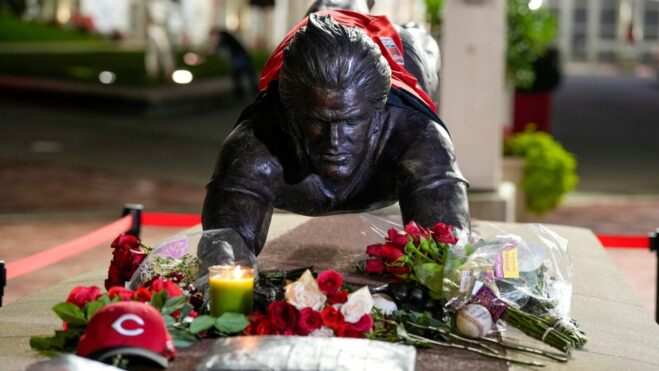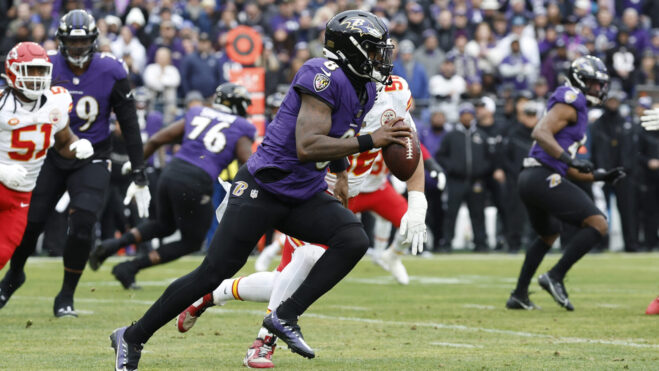‘The Personality Is The Product’: Behind The Scenes At A Live-Dealer Online Casino Studio
The casino aesthetic is a carefully crafted illusion. But the action is as real as that taking place a couple of floors below.
12 min
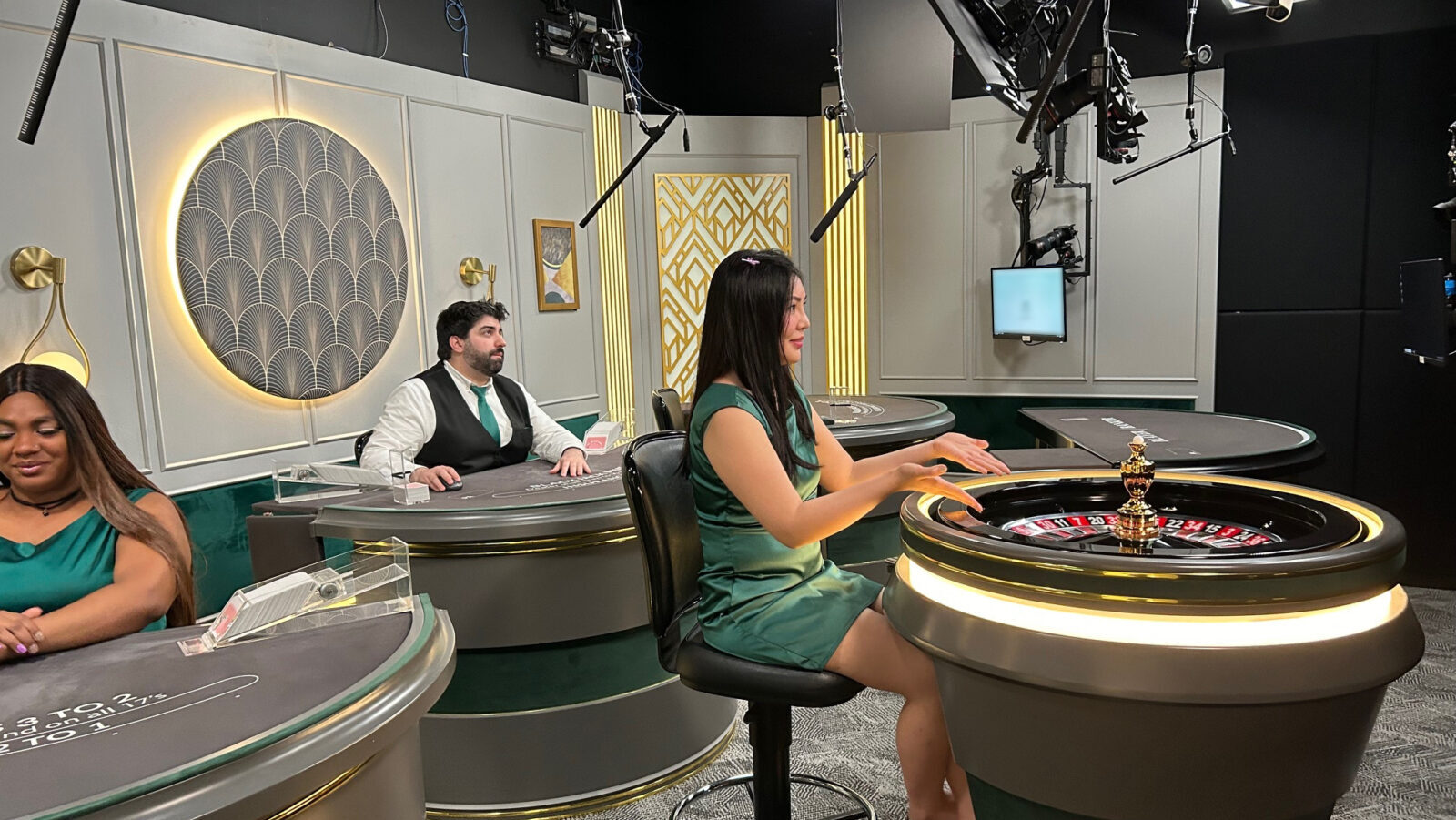
On the floor of Parx Casino at any given moment, you can hear all the familiar sounds of slot machines and card shufflers and victory celebrations and cocktail waitresses taking orders.
Elsewhere in the building, there’s a room where the same sort of legal, regulated gambling is taking place, but it’s a whole lot quieter.
Through some “authorized personnel only” doors, past a security guard, up a couple of elevator flights, and past another security guard, sits an office where blackjack and roulette dealers are spinning wheels and flipping over cards for real money — with no customers present.
For 24 hours a day, 365 days a year, real-money, live-dealer casino games are dealt out of Playtech’s studio within the Bensalem, Pennsylvania, casino — one of three such studios the company currently runs in the U.S.
Through the eyes of the cameras, it looks like a casino. But pull back to the wide view, and it more closely approximates a television studio. Boom mics hang from the ceiling. Lights are angled to illuminate the stars of the show and eliminate shadows. Cables, cameras, and monitors hover.
To the viewers, it appears spacious. In the flesh, all of the action inside what Playtech calls the “Lounge VIP area” takes place in a 286-square-foot room, with five gaming tables (three of them active as of our visit in early May) packed tightly into a space about half the size of an average New York studio apartment.
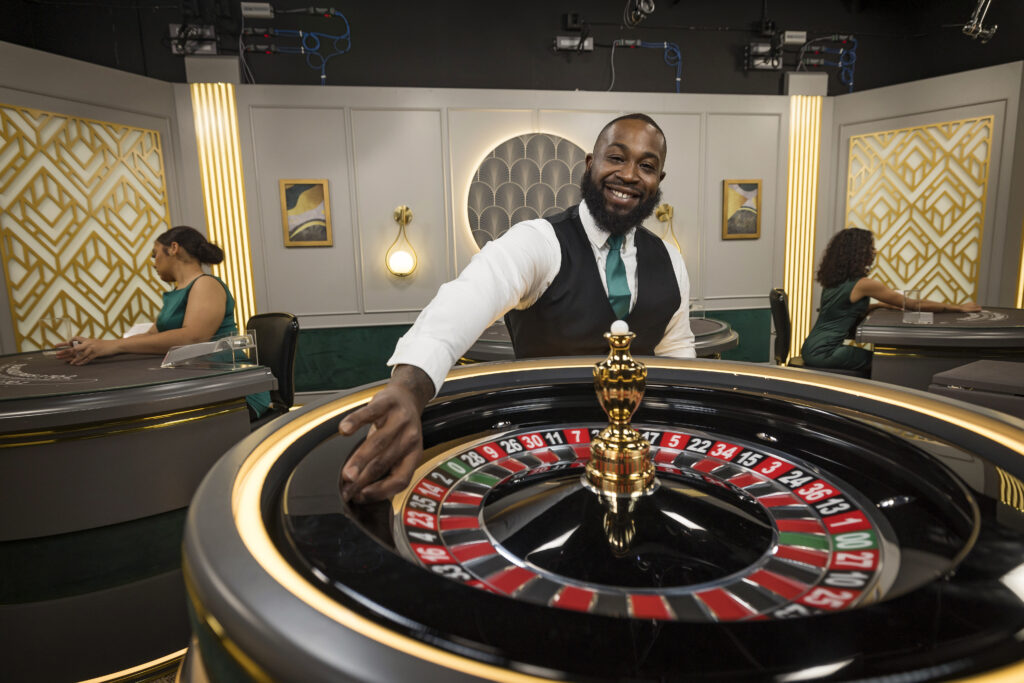
The casino aesthetic is a carefully crafted illusion. But the action is as real as that taking place a couple of floors below. Gamblers using either the betParx or BetRivers app anywhere in the state of Pennsylvania are placing bets on blackjack or roulette and watching on their phones as real, human dealers turn over real cards and spin real balls on real wheels in real time.
This is not your grandfather’s casino experience.
But at the same time, it’s considerably more like your grandfather’s casino experience than all of the purely digital blackjack or roulette options available on the same online casino apps.
A career shuffle
In 2014, Gia Reece made an unusual career pivot. One day, she was a registered nurse, and the next, she was a pit boss for the very first Playtech studio.
This happened in Reece’s homeland of the Philippines — legal iGaming in Asia is far ahead of where it is in North America — and the job change was one of the all-time “stumble into” situations. She went through numerous rounds of interviews for a company nurse job with Playtech, only for HR to offer her a position as a pit boss. It paid better, so Reece took it, having absolutely no idea what she was getting herself into.
In 2020, she moved to the U.S., and in early-2021, the Playtech brass convinced her to relocate specifically to Michigan, where she would be operations manager of the live-dealer studio they were working to open.
As operations manager, Reece looked for the office space, contracted with suppliers, and hired staff. The company got its Michigan gaming license approved in November ’21, and launched the following month.
And Reece was just about to buy a house and put down real roots in Michigan when, last spring, Playtech asked her to move to the Philadelphia area and do the same thing all over again for their studio within the Parx facility that they were aiming to launch before the end of 2023.
Now, some six months post-launch, the newest Playtech studio is humming, and Reece remains perpetually busy. She manages all the projects and the constant expansions, she oversees the IT department, she coordinates with the compliance department. But perhaps the most important part of her job is making hires. She’s not just looking for people who can deal cards. When you’re running a live-dealer studio, you’re looking for a form of on-air talent.
“To be honest, the personality is the product,” Reece said. “It’s not the casino games. Basically, every game is the same. Blackjack has mostly had the same rules since it was invented.
“At the end of the day, if they’re playing on our sites, they’re playing because of the personality that the dealers are trying to sell. So whenever we hire someone, we focus on personality. Skills, you can train. You can teach someone how to pull cards and put the cards on the table. But personality, that’s something within them. That’s the number-one thing I look for.
“I’ve been telling everyone we hire, ‘You are the product here. Not the software. You are.’”
The inside deal
“Allison” is one of those dealers Reece hired. And, yes, “Allison” is in quotation marks for a reason. The folks you see on your phone or your computer when you play live-dealer games are all using stage names.
Allison previously dealt in person, at a land-based casino, and she prefers her job with Playtech for reasons that illuminate why stage names are used.
“Dealing online is better for the fact that, in the casino, the players are allowed to drink and smoke, and once they get drunk and they’re losing money, they sometimes literally come up to your face and are like, ‘I hate you,’” Allison explained. “Here, it’s a safer environment.”
For the most part, the relationship between dealer and iCasino player is healthy — and it’s all about that personality element that Reece hires for.
“We encourage the dealers to build a rapport and engage with the guests,” said Catherine Grasso, one of the pit bosses at the Pennsylvania Playtech studio.
Added fellow pit boss Jamie Bagnell: “A lot of the dealers have what I’d consider a fan base. I’ve seen players who are regulars just hop on and check in and ask how your day is going, and then say, ‘I have to go back to work.’ They’re not even playing, they’re just saying hi.”
For accuracy’s sake, we should note that the players are not saying “hi”; they’re typing “hi.” Live-dealer gaming is, to an extent, a two-way mirror, with different capabilities on either side of it.
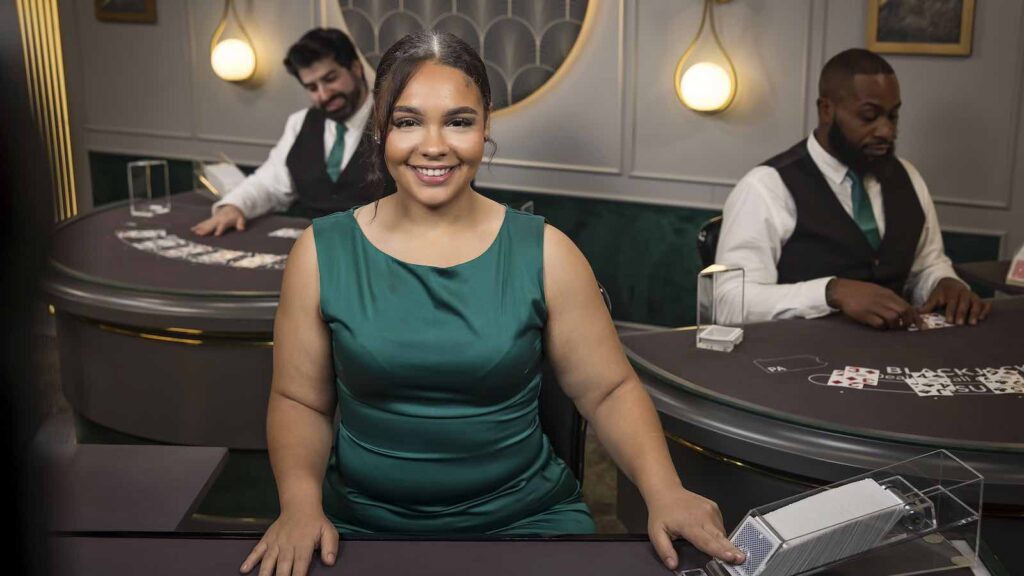
The players can see the dealers, while the dealers cannot see the players. The players can communicate with the dealers by typing into the chat box, while the dealers are miked and can talk to everyone at the table.
“It was a little bit stressful at first, but you get used to it real quick,” Allison said of the experience of being on camera and not being able to see the players she’s dealing to. “There is a kind of pressure to perform that you feel. And you’re talking to a camera, and most of the players don’t answer at all, so you’re like, ‘Is anyone there?’”
Punching the clock
Under the setup at the time of Casino Reports’ visit, the Playtech VIP area featured three active tables: two for blackjack, one for roulette.
So there were four dealers clocked in at a given time, working eight-hour shifts, with 30-minute rotations within those shifts. A dealer is on one table for a half-hour, moves to the next table for a half-hour, slides to the next table for a half-hour, and then gets a half-hour break. Rinse and repeat four times, and there’s a work shift.
A 24-hour day splits evenly into three eight-hour shifts, and at this location, those shifts are 7 a.m.-3 p.m., 3-11 p.m., and 11 p.m. to 7 a.m.
The latter, that crew working the overnight shift, is paid a premium — an extra 20%, Reece explained.
There are two pit bosses on duty at any given time, mostly observing from a control room, monitoring the action — though the pit bosses also know how to deal and can change into uniforms and step in at a table if the studio is short-staffed on a given shift for whatever reason.
But that control room, the pit area — just beyond the shuffle area, where decks and shoes are rotated in and out alongside a log book and where a wall of monitors shows all the current live feeds of games — that’s where the pit bosses spend most of their time. The movie Casino introduced much of the general public to the concept of an “eye in the sky,” and in a live-dealer studio, the pit area is where the equivalent of an eye in the sky feeds.
They can’t see the players, of course, the way Don Rickles and Robert DeNiro could. What they see is the action, the money flowing in, the money flowing out, the cards being dealt, the wheel spinning around, and the communication in the chat box.
And that last one is important. Responsible gambling is a priority at Playtech — every employee has certification in RG practices — and the chat is where problem gambling behavior often surfaces.
The system flags certain words and phrases, spotting if a player is illustrating tendencies toward financial ruin, addiction, or anything potentially suicidal. If the dealer happens to identify an issue in the chat, they too can raise a flag with a simple click of a button that informs the pit bosses to have a look.
“We have outside people monitoring everything as well,” said Grasso, “and so, we have three checks — the dealer, us, and then outside RG people. But if someone just types in certain words, like, ‘lost everything,’ or something like that, it highlights the chat so we’re drawn to it immediately.”
The dealers use the same communication method if a player is complaining in the chat that a hand was not paid out properly or that some other glitch has occurred. They have an applet through which they don’t need to say a word or even type a word, but rather just click an option for something like “complaint” or “abuse,” and the pit bosses take it from there.
Grasso, who has also worked on brick-and-mortar casino floors, said her workday goes much faster in the live-dealer studio.
“There’s so much to do here. You’re constantly surveilling. When I was on the floor, I was responsible for the floor with my eyes, but we had surveillance, I could call somebody. Now, we’re the surveillance. But luckily for us, the dealers are so knowledgeable, they really do a great job. So it makes our job much easier.”
Doubling down
Reece said everywhere she’s ever worked in iGaming, blackjack is the most popular game.
There are two distinct types of live-dealer blackjack — though only one was available at this particular studio when we were there, with the other not opening until a couple of weeks after.
The type that was running at this Playtech studio is a standard game with seven positions at the table (with a $5 minimum bet). So, with two such tables in action at the time, that meant no more than 14 customers could play blackjack at once.
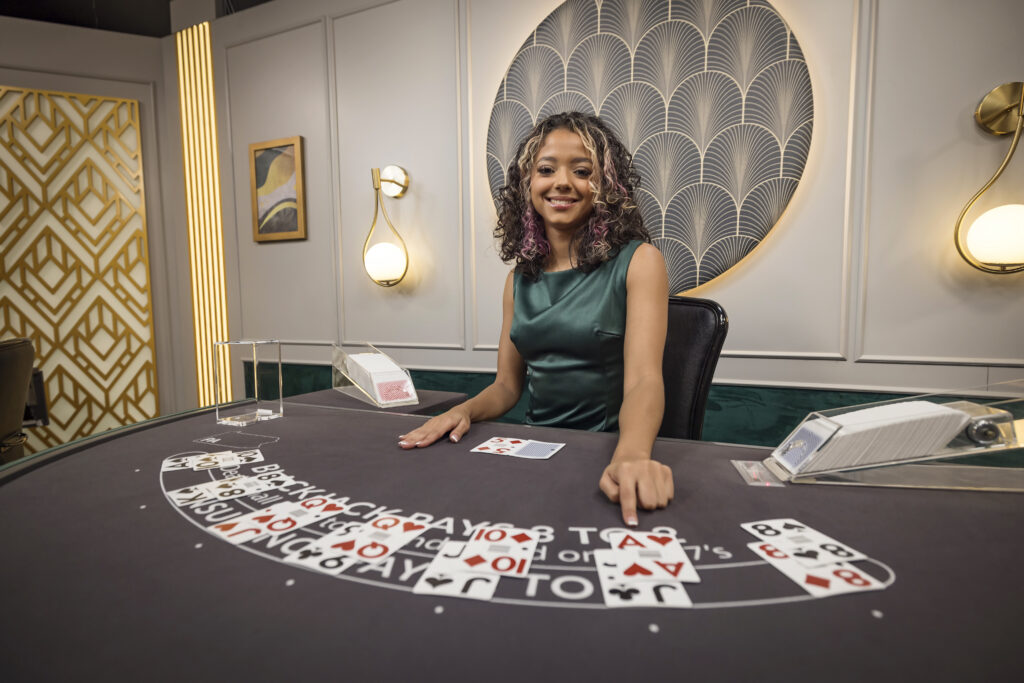
The other form of the game is all-bets blackjack. The studio’s first all-bets table opened on May 20. There’s just one spot at the table, and everyone playing at that table shares it. This is potentially far better for the house from a handle perspective, as countless customers can bet at once.
The mechanics are slightly different than in a blackjack game that has one player per position. Let’s say there are 20 gamblers playing (potentially wagering all different amounts), and they’re dealt a 16 against the dealer’s 7. Maybe 14 of them click “hit,” the other six click “stand.” Another card is dealt, and it counts toward the total for 14 players, but doesn’t count for the six who stood. Then the dealer plays out their hand, and the results among the players at the table may vary, even though they all started with the same cards.
Reece said Playtech is working toward opening a private-booking blackjack table that can be reserved by higher-rolling VIP types. And in May, the studio opened an additional seven-seat blackjack table that only operates during peak hours.
So just what are peak hours for live-dealer iCasino?
“On a daily basis, usually it’s from 7 p.m. to 3 in the morning,” Reece said. “The number of people playing at those hours is way higher. And from a weekly point of view, usually everything starts picking up around 7 p.m. Thursday, until Sunday afternoon, probably around 3 p.m. Those are the peak days.”
By contrast, there are non-peak portions of the day when the dealers are just trying to kill time, waiting for a single customer to pull up a virtual seat. During those downtimes, dealers are permitted to play games of their own, such as solitaire, on the monitors in front of them.
Live-dealer roulette is like the all-bets form of blackjack in that an unlimited number of players can share one table. There are no player decisions to be made once initial bets are placed, so the mechanics are identical to playing roulette on the casino floor, except payouts happen instantaneously with no need to wait for a dealer to count out everyone’s chips.
Casino as sports bar
Also potentially coming soon to the Bensalem studio are live-dealer baccarat and a trivia “game show.” And then there’s the addition everyone on staff seems most excited about: the live sports area.
The games will be the same, but the look, feel, and conversation will be different.
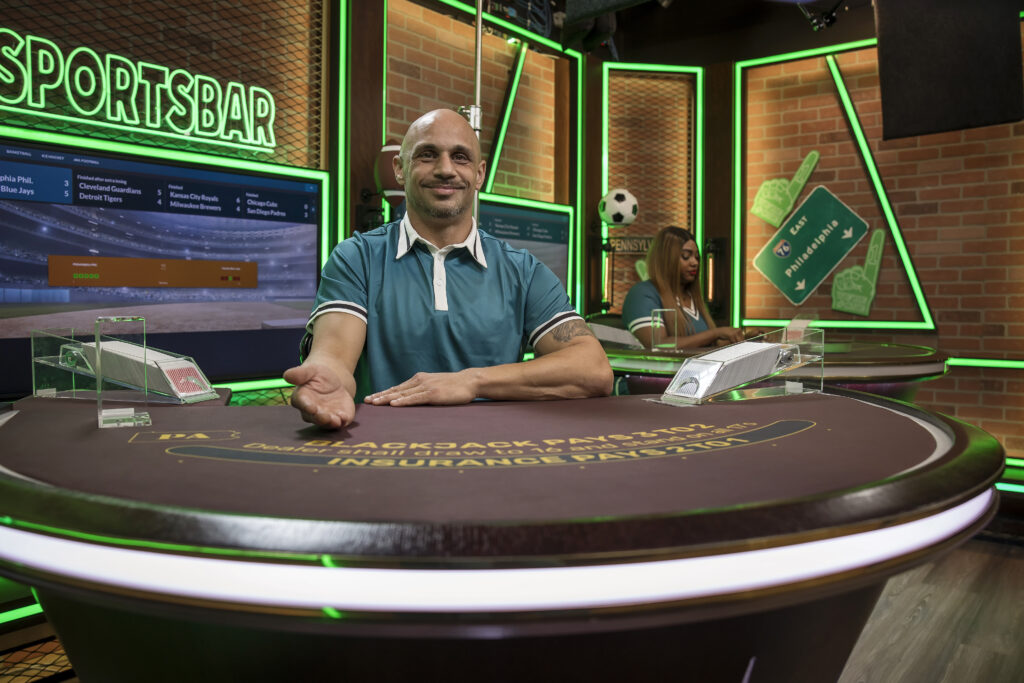
The new 148-square-foot mini-studio — a little over half the size of the Lounge VIP area — is designed to resemble a sports bar. As Parx is located just outside Philadelphia and an appreciable number of the customers playing iCasino within Pennsylvania are Philly sports fans, Eagles green is the dominant color theme. There are screens with live game scores in the background, and the dealers will largely be talking sports as they deal the cards or spin the roulette wheel.
“We can’t wait to open the sports room,” said pit boss Bagnell. “We’re adding so many new tables and games — by the end of the summer, we’re going to have a whole new look and be a lot busier.”

More rooms, more tables, and more games naturally means more staff. And nobody just walks in off the street ready to deal — not even if they have a wealth of brick-and-mortar casino experience. It takes time to learn how to juggle dealing cards with the mouse clicks required before, during, and after every hand, and then to get so smooth with it that it becomes second nature, allowing the dealer to relax and chat it up.
A couple of doors down from the Lounge VIP area where the cameras are rolling and the games are live sits the training room inside the Playtech studio. It looks similar to the real deal — a few blackjack tables, one roulette table — but there are no cameras.
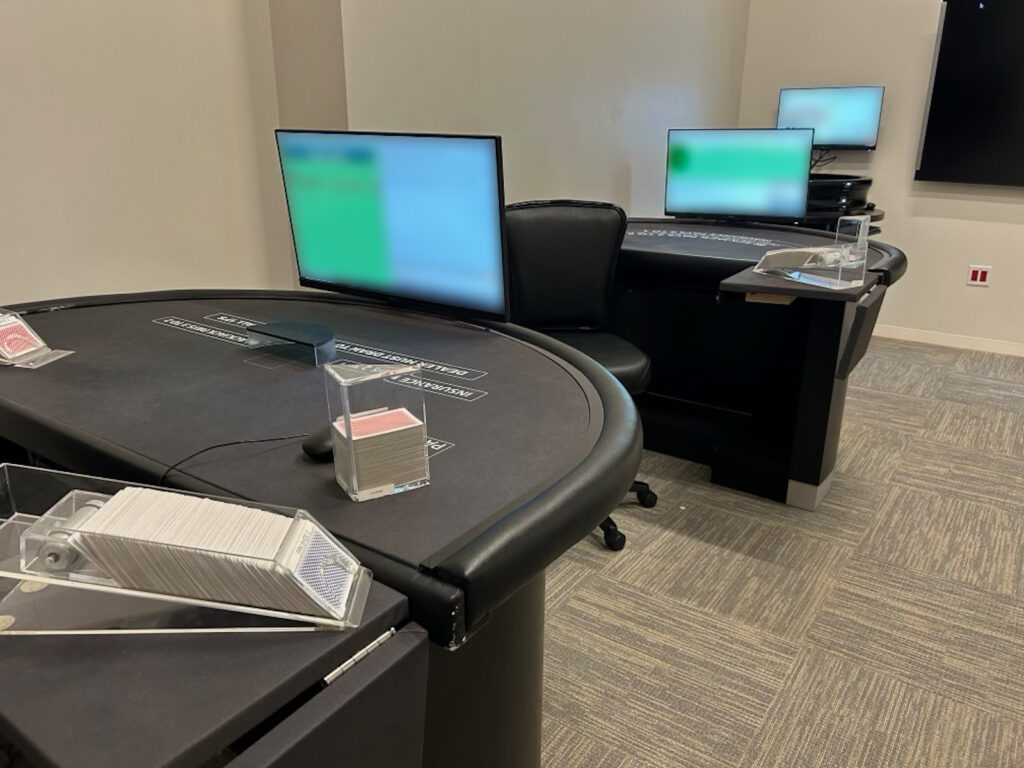
This is not for the public to see. This is a room for practice, where dealers in training can get used to the rhythms. This is a space where their roulette wheel spins are digitally monitored, where a device is tracking how fast it spins and a timer is counting how long it spins before the ball comes to rest, and there are acceptable and unacceptable ranges for both.
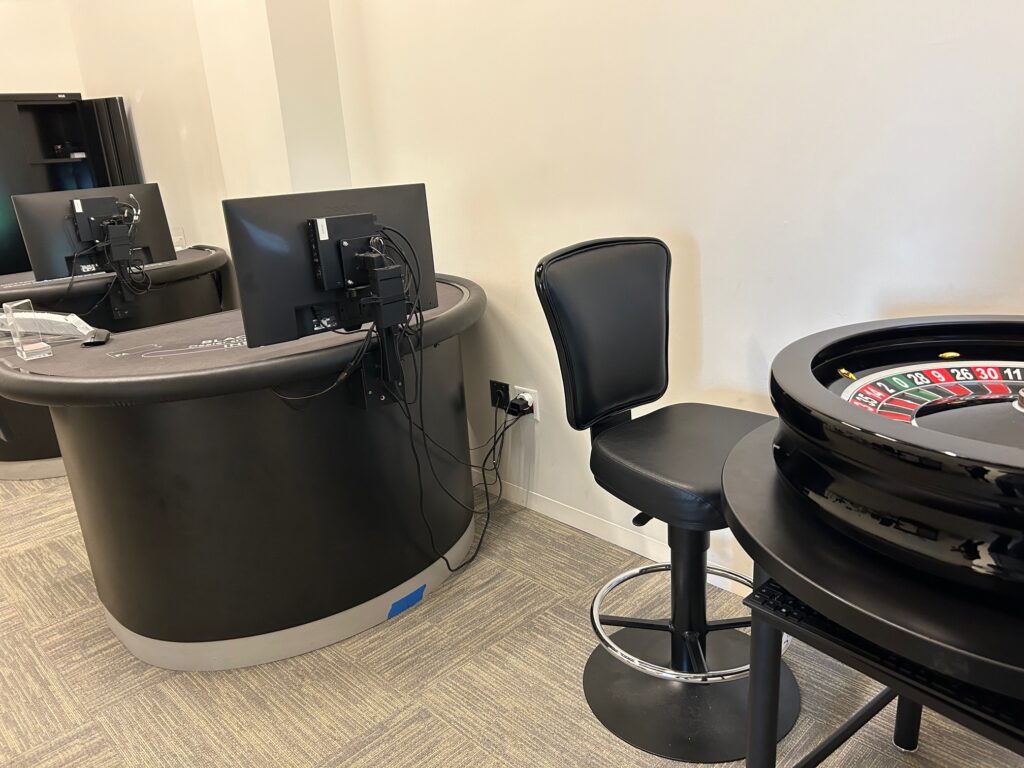
Not only does Playtech need its dealers to manage the games without errors while appealing to customers with their personalities, but it needs them not to waste time thinking through what they’re supposed to do next. As in the land-based casinos, time is money. The more hands you deal in your half-hour on a table, the more revenue betParx and BetRivers can earn.
Successes, competitors, and challenges
Playtech has other partnerships in other states beyond those two in Pennsylvania. The company’s first foray into the U.S. market came in New Jersey in 2018, followed by Michigan, and in those states it has partnered with such well-known operators as BetMGM and bet365.
At present, following recent approvals in Maryland, West Virginia, and Delaware, Playtech holds licenses in 11 states — and has more than 200 U.S.-based employees.
Perpetually looking to grow and work with other acceleration-focused iGaming companies, Playtech made waves in March 2023 with its $85 million investment in Hard Rock Digital, a deal that enables Hard Rock to license some of Playtech’s technology and content.
Playtech isn’t the only game in town, however, when it comes to live-dealer studios. Their best-known competitor is Evolution Gaming, which made headlines recently with its plans to open a new $75 million office in Atlantic City. Live dealer is a major part of Evolution’s portfolio, with revenue from the vertical up 19.8% in the first quarter of 2024 compared to Q1 2023, according to the company’s most recent earnings call.
But Reece and her team don’t seem to have the competition on their minds. Their focus, in their still relatively new studio, is on delivering for their players, whether operating three tables or 300.
“The main thing we’re paying attention to is customer service,” Bagnell said. “We’re always monitoring our dealers, making sure they have the correct posture, making sure they’re engaging. Every little thing counts when you’re trying to ensure the players have the best experience possible.”
For Reece herself, the challenge is keeping up with technology in a rapidly evolving business and making sure she always has enough staff to prevent any hiccups in a 24/7 operation.
“Maintaining the manpower was a constant challenge in Michigan, and it’s the same way here,” Reece said. “But then on top of that, I need to stay ahead of the curve if we’re going to maintain performance. This business is about technology, and technology evolves every day.
“When I started 10 years ago, the games were all so simple. There was no game show, there was nothing like Adventures in Wonderland, there was no crazy roulette game. It was all classic games. But year by year, things have changed.
“The pace is crazy, but you manage to keep up.”
Again, it’s not your grandfather’s casino experience. But as long as you can teach him how to download the iCasino app, your grandfather may just dig this and start logging on regularly — whether to entertain himself playing blackjack or roulette, or just to type a quick hello to his favorite dealer.



